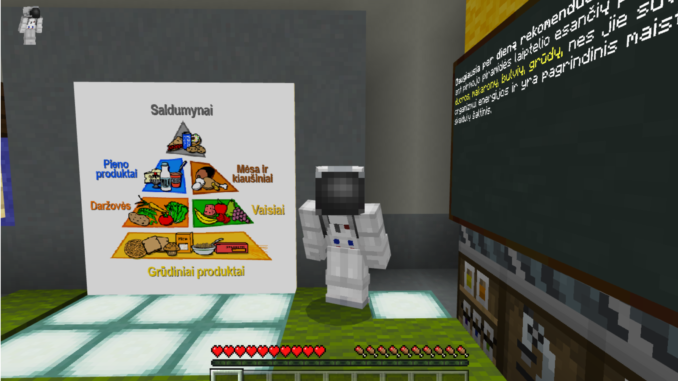
A couple of years ago, while many countries were competing to get the attention of Tesla’s investors, computer gaming fans in Lithuania managed to do that in a unique way – through a huge virtual factory construction project with Minecraft. It not only won recognition around the world but also brought innovations to the country’s schools.
“We wanted to draw Tesla’s attention to Lithuania as a good place for their new factory, so we built a replica on the Minecraft gaming platform, like a virtual model of the possible building. The New York Times wrote about it and Tesla itself also liked the idea, writing in its Twitter account that Lithuania knew the way to their heart,” says Vytautas Butkus, one of the founders of the company Trys Kubai, in a press release.
The construction work that brought international attention took a full 36 hours. It could be followed in real-time on the Internet.
“The kids who did it asked us a lot of questions – and not only about Minecraft or Tesla, but also about electric vehicles, green energy, and the Kruonis power plant,” Butkus recalls.

That, he says, is when his team realised that by using this game they were talking in the children’s language and could interest them even in highly complex topics.
“It went to show that children are curious by nature, for them, there aren’t any boring things. We understood that providing kids with information in a form they like solves many everyday learning challenges. It’s easier to get their interest,” Butkus says.
He also notes that the learning process becomes more effective when, together with theoretical information, children are also given an opportunity to engage.
Plans for schools abroad as well
“Minecraft is a sandbox type game – sort of like Lego but moved to the digital world. In it you can not only create activities for classes but also give kids space for they themselves to be creators,” he says.
A hundred classes of Lithuanian first graders have already tried classes with Minecraft – and that number is set to grow since the social enterprise intends to expand its activities.
“We plan to develop a special educational platform and offer it to primary school classes all over Lithuania. One thing that will help is the 20,000-euro prize sponsored by Tele2 that we won in the Reach for Change organisation’s “Talent to Change” competition this spring. No less important is professional help at the business incubator where we’re getting valuable advice. And we won’t stop there – if the product does well in Lithuania, we hope to also offer it to schools in other countries,” the social entrepreneur says.

According to Butkus, one of the company’s goals is to contribute to the United Nations Agenda goals of quality education and reduction of inequality, which are highly relevant in Lithuania as well.
“We’re happy to be able to share and contribute to the social changes that children in the country need. I’m confident that this daring project will help schools take advantage of technologies for developing modern-day assignments and more effective learning,” says Petras Masiulis, the CEO of Tele2.
From perimeters to the food pyramid
As Vytautas Butkus puts it, given the sandbox characteristics that were mentioned, Minecraft can be put to use in any subject area: kids can calculate the perimeter and area of a house during mathematics, work through a labyrinth of words in Lithuanian class, or gather food products from a digital market while learning about the food pyramid during social studies.
“A publisher of exercises and textbooks is helping develop activities for our platform, so the new tools are integrated into the approved school programmes. Minecraft is just an additional learning method,” he says.
He adds that he has not yet come upon a class where the game cannot be used – everything depends on the creativity of the developers and the pupils.
To be sure, since a lot is also being said these days about children’s addiction to technologies, the platform’s creator stresses that he takes the matter very seriously.
“We hope the product that we’ve built will create the conditions for adults and children to talk about having a healthy and productive relationship with technologies. The world is advancing rapidly, so technologies will only multiply – we, for our part, are offering a useful product for the time that parents, teachers, and children do decide to spend at the screen,” Butkus explains.

Be the first to comment